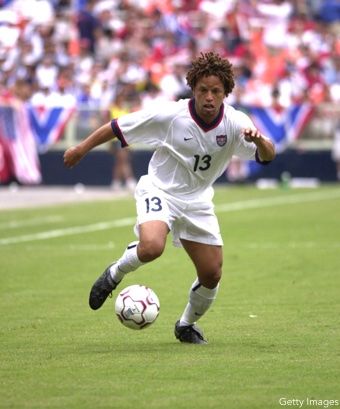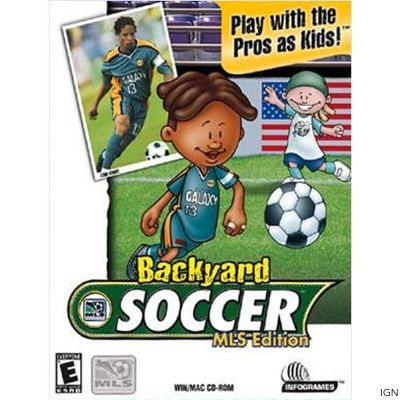Cobi Jones has a cult following among millennials. He can thank a kids computer game for that.
In 2001, Jones was one of the most accomplished American players. He had played in two World Cups, won U.S. Soccer Athlete of the Year in 1998 and been named to an MLS Best XI. Humongous and Atari hoped to capitalize on Jones' high profile by putting him on the cover of Backyard Soccer MLS Edition.
"It was a group that came up to ask me if I wanted to be a part of it, and of course I said, 'Yes,'" Jones remembers. "I knew early on that I wanted to inspire youth. Going out to young kids was important and I've always tried to be a good role model, so to be part of the Backyard Soccer game was something I was going to participate in. I understand the importance of being an athlete and having kids look up to you, so any way, shape or form that I can put myself out there in a good way, I'm going to do it."
Soccer in the U.S. was in an interesting phase. The sport was trying to maintain its popularity that came from the U.S. hosting 1994 World Cup. The Women's National Team won the 1999 World Cup title in dramatic fashion on American soil, thanks to Brandi Chastain's PK. MLS was a half-decade old and the Women's United Soccer Association was just getting started.
The Backyard Sports series was a hit among American children. By 2001, the series had put out its original Backyard Baseball and Backyard Soccer with fictional players. But Backyard Football changed the dynamic of the series in 1999 by incorporating professional players. Backyard Football allowed users to play with kid versions of Barry Sanders, Brett Favre, Dan Marino, Drew Bledsoe, Jerry Rice, John Elway, Randall Cunningham and Steve Young.
The baseball and soccer games made the transition in 2001. MLS slapped its license on the game and 12 MLS and three U.S. Women's National Team players appeared as kids, including Jones, Chastain, Brian McBride, Jason Kreis, Carlos Valderrama and Briana Scurry.

"Our goal was to help establish soccer in this country and have it grow to be a mainstay sport," Jones says of his mindset in 2001. "It was an amazing time that I wont forget, being part of that group that helped establish soccer in this country. It's a sentimental memory for me, and I hope it doesn't die. Giving kids the opportunity, the act of play and participating in sports is the goal. You're trying to implement habits that last a lifetime. With MLS, that's what we basically did."
Those who played the game, which was targeted for ages 5-10, may remember cover boy Jones' elite speed and wavy dreadlocks.
"Whatever it takes. So long as I'm remembered for something," Jones says with a laugh about his hair.
After the release of Backyard Soccer MLS Edition, Jones wrapped up one of the greatest careers in the history of American soccer. He played in his third World Cup in 2002 and he is the USMNT all-time leader in caps (164). In 2005, Jones became the last original MLS player still with his original 1996 team (Los Angeles Galaxy). He played in 306 MLS games. Jones' 91 MLS assists are eighth all time and after his 2007 retirement, he served as a Galaxy assistant coach from 2008-2010.
Jones also returned to as a player in Backyard Soccer 2004, adding to his youthful following.
"It happens every once in a while," he says of people mentioning Backyard Soccer to him. "I wouldn't say nowadays it happens too much. I think all those Backyard Soccer players have gotten older and they're probably working all the time, but it's an honor for me to realize that I had an effect on people that they still remember that game. I especially love it when people come up and tell me they used to play that game all the time and loved running down the field with me and scoring goals."
Some of Jones' Backyard Soccer fans may not have even been born when he made his lone Olympics appearance in 1992. The Barcelona Games required every player to fit U-23 rules (since 1996, three players 23 or older have been allowed to play for each squad). A 22-year-old Jones, fresh off a career with the UCLA Bruins, went off to Spain.

"During the walk out to the Opening Ceremony, they actually split the entire U.S. team into two groups and put the Dream Team in the middle," Jones says of seeing the first group of NBA players to play in the Olympics. "I can still remember looking over my shoulder and seeing [Karl] Malone and those guys. It was a little surreal to be a part of that whole Dream Team story, and it just made my Olympic experience really special."
The U.S., which has never medaled in Olympic soccer, went 1-1-1 in group play in 1992, failing to reach the knockout stage.
"It had been a long hard fight to get there," Jones recalls about the Olympics. "You have to go through the qualifying process, playing against other countries. You have to participate and compete to gain a starting position, just to be on the squad. There are lots of different moments when you have to be competitive and overcome obstacles to get to where I was."
Despite his talents and popularity, Jones wasn't able to cash in on soccer the way current players can. In fact, his retirement led to an MLS rule change that would have benefited him.
"The designated players salaries!" Jones exclaims when asked about the modern MLS.
In March 2007, Jones announced he would play his final season with the Galaxy. Two months earlier, David Beckham announced he was joining the Galaxy that summer. He signed a five-year, $32.5 million deal and the designated-player rule was born, allowing teams to sign three players over the salary cap. By then, Jones was 37 and not worth the salary, despite his name brand.
"The game is more in the spotlight now, and it would have been great to have that influence and that ability to reach out on a massive scale and have a positive effect on people," he says. "The soccer world has really broadened its horizons and we're tapping into communities we never have before."
Jones continues to connect with kids, this time through a fitness initiative. In a partnership with Dr Pepper Snapple Group and Let's Play, Jones is helping to provide kids and families with the tools, places and inspiration to make active play a daily priority.
"Organized sports is that microcosm of life," Jones says. "Learning how to win, how to be a good winner, how to be a good loser, how to interact with other kids -- even kids you don't necessarily like. You find a way to get the job done because you all have that common goal."
Although it is easy in theory to say kids should just go out and play, the Backyard Soccer star knows sometimes, other resources are needed to encourage exercise. Sometimes, even video games can help.
"Of course I've played the game!" he says of Backyard Soccer. "I played with myself. I hope for the chance to be able to play with my kids. If that inspires them to go out and play, I'm all for it."
In the Backyard Soccer world, Jones will always be a kid himself.
More Soccer:
-- Becky Sauerbrunn: Other Countries Reach Out About Equal Pay
-- Christen Press Talks Olympics, Equal Pay And Deep-Dish Pizza
-- USMNT Releases 'One Nation, One Team' Video For Orlando Shooting Victims
Follow Jeffrey Eisenband on Twitter @JeffEisenband.






